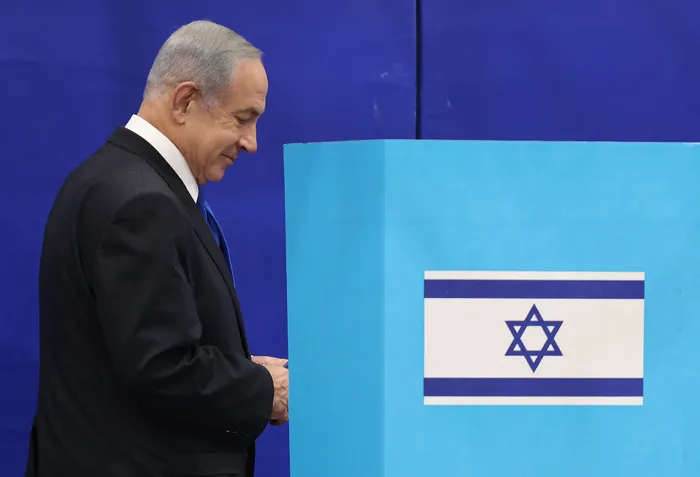Tens of thousands in Israel rally against ‘Dictator's Bill’ as legislators vote on judicial overhaul

Picture: Ronaldo Schemidt / AFP – Likud chairperson Benjamin Netanyahu casts his ballot at a polling station in Jerusalem in the country’s fifth election in less than four years on November 1, 2022, which ushered in a far-right government led by extremists. If right-wing reforms giving Prime Minister Benjamin Netanyahu and members of parliament more power over the judiciary are passed, "the protests will intensify", organisers said.
By Kenny Stancil
Tens of thousands of people opposed to the far-right Israeli government's proposed judicial overhaul once again hit the streets of Jerusalem and Tel Aviv on Monday, where they implored lawmakers to vote against the measures during the afternoon's first reading.
"On the morning of the vote, small groups of protesters sat down outside the front doors of some coalition lawmakers' homes in a bid to block them from leaving for parliament. They were removed by the police," The New York Times reported. After blocking highways to Jerusalem, protesters gathered outside parliament, where doctors "set up a mock triage station for 'casualties of the judicial reform.'"
Despite weeks of massive demonstrations, members of the Israeli Knesset are expected to pass the legislation, which is supported by right-wing Prime Minister Benjamin Netanyahu and his close ally, Justice Minister Yariv Levin.
If that happens, the Supreme Court's ability to overrule parliament would be weakened, as a simple 61-vote majority could override the court's decisions; the Supreme Court's ability to review and strike down attempts to change Israel's 13 quasi-constitutional "Basic Laws" would be abolished; and the ruling coalition would gain control of the Judicial Appointments Commission, a panel tasked with picking new judges.
The legislation must be approved three times to become law, with Monday afternoon's vote marking the first step in the process. Israeli President Isaac Herzog, a largely ceremonial figure, and opposition leader Yair Lapid have pleaded for Netanyahu's government to delay the legislation, to no avail.
On the eve of the initial vote, Levin said, "We won't stop the legislation now, but there is more than enough time until the second and third readings to hold an earnest and real dialogue and to reach understandings."
But as the Times noted, "critics have dismissed the government's position as disingenuous, arguing that once the bills have passed a first vote, only cosmetic changes will be possible."
Organisers, for their part, said Monday that "with the passage of the dictator's bill, the protests will intensify," according toi24 News.
Protesters begin to gather in Tel Aviv, with tens of thousands expected to turn out across the country, as the Israeli Parliament is set to begin the voting process on the hotly debated judicial reform bills pic.twitter.com/3irguFH564
— i24NEWS English (@i24NEWS_EN) February 20, 2023
Now in #jerusalem tens of thousands of anti government protesters march around the Israeli parliament pic.twitter.com/nlf3HiHqWO
— Oren Ziv (@OrenZiv_) February 20, 2023
Opponents "say the proposed overhaul would place unchecked power in the hands of the government, remove protections afforded to individuals and minorities, and deepen divisions in an already fractured society," the Times reported. They also worry that "Netanyahu, who is standing trial on corruption charges, could use the changes to extricate himself from his legal troubles."
In addition, Al Jazeera reported, opponents fear that "Netanyahu's nationalist allies want to weaken the Supreme Court to establish more settlements on land the Palestinians seek for a state. But settlements, which are considered illegal under international laws, have continued under successive Israeli governments. Nearly 600,000 to 750,000 Israelis now live in illegal settlements in the occupied West Bank and East Jerusalem."
Last week, Netanyahu's administration granted retroactive "legalization" to nine such settlements, and the prime minister has also intensified deadly raids, killing at least 50 Palestinians in occupied territories so far this year.
A right-wing neutering of the Supreme Court could exacerbate Israel's regime of violent dispossession and ethnic cleansing.
But the weeks-long demonstrations against the proposed judicial overhaul "include very few Palestinians", Jewish Currents editor Peter Beinart observed Sunday in a Times op-ed titled "You Can't Save Democracy in a Jewish State."
"In fact, Palestinian politicians have criticised them for having, in the words of former Knesset member Sami Abu Shehadeh, 'nothing to do with the main problem in the region — justice and equality for all the people living here’," Beinart wrote.
"The reason is that the movement against Mr Netanyahu is not like the pro-democracy opposition movements in Turkey, India, or Brazil — or the movement against Trumpism in the United States," he added. "It’s not a movement for equal rights. It's a movement to preserve the political system that existed before Mr Netanyahu's right-wing coalition took power, which was not, for Palestinians, a genuine liberal democracy in the first place. It's a movement to save liberal democracy for Jews."
For Palestinians, Israel is not a democracy but rather an apartheid state, an assessment shared by numerous human rights groups around the world. The Israeli government has enacted discriminatory laws against Palestinians and colonised their land for decades, including under Lapid.
According to Beinart: "The principle that Mr Netanyahu's liberal Zionist critics say he threatens — a Jewish and democratic state — is in reality a contradiction. Democracy means government by the people. Jewish statehood means government by Jews. In a country where Jews comprise only half of the people between the Jordan River and the Mediterranean Sea, the second imperative devours the first."
"Ultimately, a movement premised on ethnocracy cannot successfully defend the rule of law," he added. "Only a movement for equality can."
Kenny Stancil is a staff writer for Common Dreams
This article was first published on Common Dreams